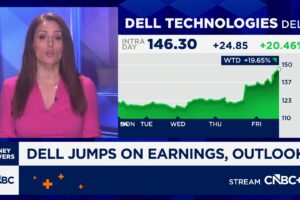
Huixinjia Capital Group, Inc., a Chinese investment firm, hopes to raise up to $700 million from U.S. investors at a valuation of $7 billion, and why not: it claims George Soros as a founder and director, has its main office in New York, and uses advanced artificial intelligence technology to manage its assets and investment strategy.
Except that some and maybe all of those claims do not appear to be true. The type of offering Huixinjia has applied for, a Reg A+ deal or so-called mini-IPO, is only allowed to raise up to $50 million. The description of its investment strategy and techniques “is plagiarized whole cloth from Ares Management Corp.’s ARES, -1.06% 2014 IPO prospectus, except with Ares’ name replaced with Huixinjia,” Renaissance Capital’s Matthew Kennedy pointed out in a blog post that uncovered the discrepancies.
The New York “office,” in a small building above a hardware store just north of the Flatiron district, appears to be nothing but a mailbox — another tenant in the building, NYMail, has been providing businesses with a prestigious virtual New York address since 1985. It was registered in April, though the company’s business in China appears to have existed since 2016 as the company filed an S-1, instead of an F-1 as foreign issuers must use.
As for Soros, the well-known financier’s biography in the filing does not match the one on his own website, or his foundation’s. Huixinjia says that prior to 1990, Soros was an executive at Drexel Burnham Lambert, but Soros started his hedge fund in 1970. The bio appears to be cut and pasted from a bio of John Kissick, a co-founder of Ares and director of Ares Management Corporation, Kennedy said.
“Not our George Soros,” a spokesman for Soros’s the Open Society Foundations in New York wrote in an email asking if he was involved with Huixinjia.
While an egregious example, this is exactly the type of outlandish offering out of China that this column has been warning U.S. investors about for the past two years. IPOs out of China offer convoluted corporate structures, terrible corporate governance and little or no accountability to investors if things go wrong, and have already caused one meltdown on Wall Street. While U.S. regulators are finally paying attention to the risks imposed on U.S. investors with these deals and have proposed some legislation to make the Chinese entities more accountable, that legislation, as currently proposed, could end up leaving any U.S. investors holding the bag.
There has been somewhat of a pause in such offerings this year, after a banner 2018 in terms of funds raised by Chinese companies in the U.S. President Trump’s trade war with China appeared to put a damper on the deal flow, but after a temporary truce was reached between Trump and Chinese President Xi Jinping at the end of June, some companies have been dusting off their filings, with a new batch of Chinese companies hoping to raise a total of about $1.8 billion.
This newest crop, while not all as seemingly fraudulent as Huixinjia appears to be from its filing, is frightening.
Most Chinese IPOs of recent vintage are like one that went out this week: Chinese copycats of American tech companies. DouYo International Holdings DOYU, -4.98% is similar to Twitch, the videogame-focused streaming service owned by Amazon.com Inc. AMZN, -0.68% AMZN, -0.68% and seems the most legitimate of the bunch. But it’s not even the first Twitch-like company to go public out of China. Rival Huya Inc. HUYA, -2.61% one of the better performing Chinese deals from last year, has that honor, and it also shares Tencent as a major investor.
DouYo began trading Wednesday and is the biggest Chinese IPO of the year so far, topping the Starbucks Corp. SBUX, -1.31% of China, Luckin Coffee Inc. LK, +0.50% , despite pricing at the low end of its price range to raise about $775 million. The offering gives its largest investor, Tencent 700, +1.46% a 37.2% ownership after the IPO. The deal was not received well, with its shares closing the week lower than their initial offering price.
It seems that China may have run out of copycat opportunities though after last year’s packed slate that including the Netflix of China (iQiyi Inc. IQ, +2.24% ), the Groupon of China (Pinduoduo Inc. PDD, -0.69% ) and more. So now, we are moving onto creations that are even more unproven such as cloud-controlled robots and advertising holograms.
CloudMinds CMDS, +0.00% has a potentially wacky sci-fi-like premise: controlling robots with its brain infrastructure in the cloud (a take on Skynet from Terminator?). Giving the company some legitimacy are Softbank Group Corp. 9984, +2.91% a big investor and partner, as well as co-founder and Chief Executive William Huang, whose tech credentials include 12 years at UTStarcom UTSI, -1.62% as chief technology officer and four years at AT&T’s T, -0.91% Bell Labs.
CloudMinds’s infrastructure runs a version of Softbank’s humanoid robots, called Cloud Pepper. Customers can plug in their own preferences for Cloud Pepper robots, which can be used as a receptionist in hotels or retail stores, as one example of the benign uses of CloudMinds cloud brain.
So far, though, the company only has a small number of customers, with six companies accounting for 97% of its total revenue of $121 million in 2018. The most recent quarterly results are also likely to make some investors nervous. Total revenue for the March 2019 quarter tumbled 62.7% to $12.4 million, down from $32.7 a year ago. CloudMinds said the decline in revenue in the quarter was primarily due to “delivery timing of purchases related to smart city projects.” The company is looking to raise about $500 million in its offering.
A much smaller deal is in the works by an even stranger company called WiMi Hologram Cloud Inc. WIMI, +0.00% which develops a holographic advertising system. It plans to raise about $50 million and says it is the leading holographic augmented-reality application platform in China. Its service lets users insert real or animated three-dimensional images into video footage. Its advertising system embeds holographic ads into films and shows on streaming platforms in China.
WiMi’s year-over-year revenue growth in 2018 is not that impressive, with the company showing only 17.3% revenue growth (to $32.8 million for the full year). The March quarter of 2019 showed stronger growth of nearly 60% to 78.5 RMB ($11.2 million U.S.). The company said it gets 80% of its revenue from its AR advertising services and middleware products.
It boggles the mind that there are investors out there willing to pay money to own part of an unproven holographic-ad company, especially one that will not hand over any control with the purchase: WiMi chairman Jie Zhao will control a whopping 88% of the voting rights.
That type of control should be enough to scare off any investor who was not already spooked by the unproven technology at the heart of the company, the weak financial performance, or the standard horrible corporate structure. But if the past two years have shown us anything about Chinese IPOs, it is that the money always seems to be there, even when U.S. investors should know better by now.









